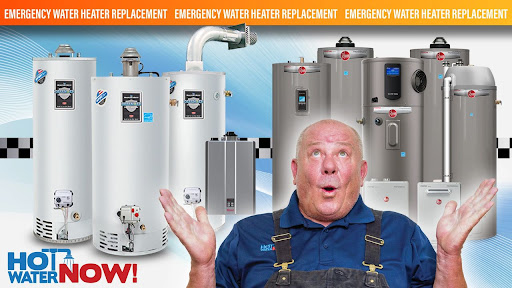Top 4 Reasons Water Heaters Fail: From Age to Sediment Buildup

Don’t Get Left in the Cold, Call Hot Water Now! for Your Water Heater Needs
Hot showers and warm baths are a luxury we often take for granted until our trusty water heater decides to call it quits. But what causes this essential household appliance to fail? Is it just old age or something more sinister lurking in the depths of your tank? Let’s explore the most common reasons water heaters fail, from sediment buildup to faulty parts, so you can stay ahead of any potential issues and keep enjoying that steamy shower experience.
See, hear, and feel the signs that your water heater is getting old:
- You have to wait longer for hot water
- There is rust or corrosion on the tank
- Water leaks from the tank
- The burner or pilot light goes out frequently
- The flame is yellow instead of blue
- There is excessive noise coming from the tank
Age: If your water heater is over 10 years old, it’s more likely to fail. This is because the internal components can start to break down and corrode over time. As water heaters age, they become less efficient and more prone to sediment buildup. The average lifespan of a water heater is 8-12 years, so if yours is approaching this age, it’s time to start planning for a replacement.
Pro Tip: Keep a photo of your water heater rating plate on your phone. Bonus if you also have a photo of the entire water heater including plumbing and venting to share with a plumber in the event of a service call or emergency.
Sediment and Corrosion: As water is heated and then reheated again, minerals begin to collect in the tank. Over time, this sediment will build up and cause the bottom of the tank to overheat. The result is decreased efficiency and an increased risk of the tank rupturing.
Corrosion is another major issue that leads to water heater failure. The inside of your water heater tank is lined with a sacrificial anode rod that helps protect it from corrosion. As the anode rod corrodes, it becomes less effective at doing its job. Once the anode rod has been completely consumed, the tank itself will become the object of corrosion leading to leaks and eventually complete failure of the unit.
Improper maintenance: Routine maintenance leads to longer equipment lifespans and can prevent unnecessary and expensive emergency repairs. Lack of maintenance is one of the top reasons water heaters fail. Neglecting to flush your water heater on a regular basis can lead to sediment buildup causing the burner to overheat. Sediment causing your water heater to work harder than is necessary will shorten the lifespan of your water heater and may void the warranty. Check your owner’s manual for proper maintenance procedures and how often to perform routine maintenance.
Thermostat and Valves: If your water heater is more than 10 years old, it’s likely that the thermostat or valves are failing. Thermostats control the temperature of the water in the tank and can become inaccurate over time. If your thermostat is set too low, the water won’t get hot enough. If it’s set too high, the water will get too hot and could damage the tank. Valves are responsible for regulating the flow of water in and out of the tank. If they become corroded or damaged, they may not be able to properly regulate the flow of water, which can cause problems. If you think your thermostat or valves might be failing, it’s important to have them checked by a professional as soon as possible.
Hot WaterNow! is the premier provider of water heater systems in the Denver metro area. From maintenance, repair, and emergency replacement services, we are here to help. Our team of certified technicians can quickly diagnose any issue you may be having with your hot water system and provide an efficient solution that will get things back up and running in no time. Let us take care of all your hot water needs so that you can have peace of mind knowing everything is working!

